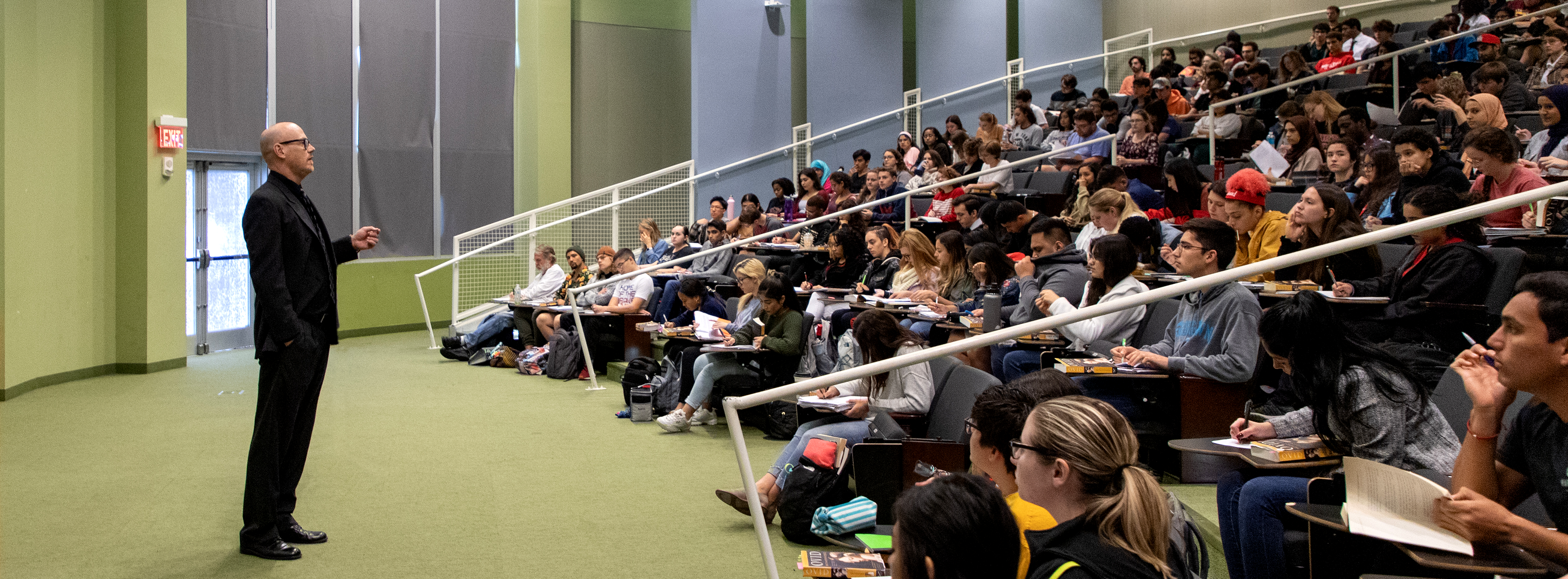Human Situation
Great Books, Great Conversations
As part of their liberal education, all students in the Honors College at the University of Houston take a two-semester course called "The Human Situation" during their freshman year. In this course, we begin the study of our cultural heritage by examining texts from the Greek, Roman, Hebrew, Christian and Islamic cultures of antiquity. The modern world is deeply rooted in these cultures, and they were themselves inspired and shaped by Homer's epic poems, by Platonic philosophy and by the Hebrew Bible, New Testament and Qur’an. These key texts, or "classics," present compelling, if not always harmonious, insights into human situations: the excellences proper to human beings; the character of the human soul; one's relations to family, friends, lovers, strangers and the gods or God. The greatest thinkers of antiquity concerned themselves with the elaboration, criticism and reconciliation of these powerful insights, and in doing so, they took up once again the intriguing question of how to live one's life. The result of their efforts is a shared and open conversation concerning the most important matters for human beings. The "Antiquity" semester of Human Situation also features a writing program comprising lectures, labs and customized materials, as well as peer tutor and faculty support. The program aims to elevate both the stylistic and critical facets of students' writing to the high level appropriate to Honors classes.
In the second semester, "Modernity," we continue our study and interpretation of these cultural traditions. Guided by careful readings of what others have written, we attempt to discover our own ideas and commitments by speaking and writing about these texts. By reading, speaking and writing, we learn to develop and refine our participation in the great conversation. Many topics naturally emerge as important to our reflection on the texts in the "Modernity" course. Recently, we paid particular attention to the concept of maturation; other examples of the recurring focus of a Human Situation semester are prophecy, liberty, virtue and the gods (or God), the journey within, self and soul, the laws and the Law. The reading list varies from year to year and is necessarily selective. The omission of certain important writings of antiquity or modernity during a semester does not imply they are not equally worthy of attention. Rather, this omission is a reminder that reading and conversation — our continuing pursuit of a liberal education — does not come to a close with the final examination.
The Human Situation is the gateway course of the Honors College.
Gateway to what?
To liberal education generally, the great conversation over books and ideas that continues onward in a life of learning. This is a 10-hour sequence that helps you hone your critical thinking and writing skills while reading great religious, literary, philosophical and political texts. It is interdisciplinary to the core, team-taught in lecture and student-driven in discussion. You will emerge from it a fearless reader, confident in your ability to talk with professors and others about major aspects of being human. You will also be a much stronger writer and critical thinker — skills that transfer to any area of study.
To the Honors Community, which grows from the teams and sections of this course. The student sitting next to you might just become a friend for life. You will share hours of challenging, intriguing and entertaining discussion, finding ways to work together and complement each other’s strengths. You will come to know not just one, but a whole team of professors, who run other programs and teach other classes in the Honors curriculum.
To the great possibilities of interdisciplinary study that our Honors minors and programs have to offer. You might find yourself excited about political and ethical texts and turn to our Phronēsis minor. You might read of the Plague of Athens and decide your interest lies in Medicine and Society. Or the Greek Muses might awaken your creative side, which you can further strengthen through the minor in the Center for Creative Work. Or maybe the reading of ancient Israel, Greece, Italy and other places will motivate you to study abroad with our faculty-led tours.
In sum, the Human Situation is a big, long welcome to the world of ideas.
Official Learning Outcomes:
-
Students will develop their critical reasoning in reading, discussing and writing on a variety of classic texts.
-
Students will become familiar with some of the central philosophical, political, historical and scientific issues that have dominated the history of Western thinking.
-
Students will enhance their communication skills through intensive small-group discussions and oral examination finals.
